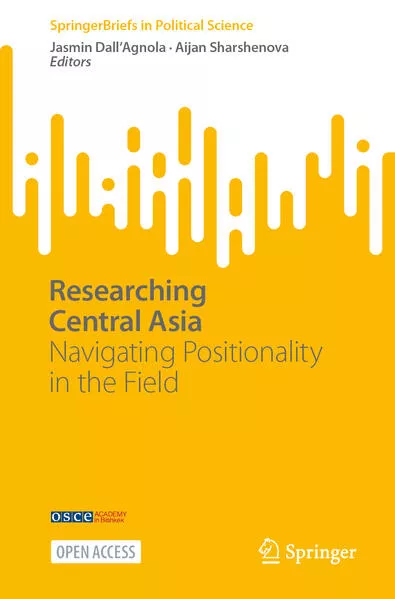
- Publikationen ca: 2
- Fragen & Antworten
Jasmin Dall'Agnola
Aijan Sharshenova is a postdoctoral research fellow at the OSCE Academy in Bishkek, Kyrgyzstan. Dr. Sharshenova holds a Ph.D. in Politics awarded at the University of Leeds, UK. Prior to joining the OSCE Academy, Dr. Sharshenova has worked at the UN and UNDP country offices in the Middle East.
Researching Central Asia
This open access book explores some of the struggles and challenges that researchers and practitioners face when conducting research in the Central Asian research setting. Written for scholars still in the planning stages of their research, it addresses key questions, including: How shall we problematize and reconceptualize the concept of positionality through lenses of local voices from the region? How does practitioners’ and scholars’ positionality contribute to their experiences of inclusion, exclusion, and access to the field? How do scholars navigate issues of personal safety and mental well-being in the more closely monitored societies of Central Asia?The book includes contributors from both Central Asia and Western countries, paying particular attention to the ways researchers’ subjectivity shape how they are received in the region, which, in turn, influences how they write about and disseminate their research.
Researching Central Asia
This open access book explores some of the struggles and challenges that researchers and practitioners face when conducting research in the Central Asian research setting. Written for scholars still in the planning stages of their research, it addresses key questions, including: How shall we problematize and reconceptualize the concept of positionality through lenses of local voices from the region? How does practitioners’ and scholars’ positionality contribute to their experiences of inclusion, exclusion, and access to the field? How do scholars navigate issues of personal safety and mental well-being in the more closely monitored societies of Central Asia?The book includes contributors from both Central Asia and Western countries, paying particular attention to the ways researchers’ subjectivity shape how they are received in the region, which, in turn, influences how they write about and disseminate their research.

